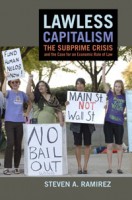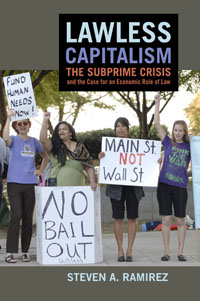 Author: Steven A. Ramirez
Author: Steven A. Ramirez
Publisher: New York University Press – 286
Book Review by: Sonu Chandiram
This book looks at one of the somewhat overlooked causes of the lending crisis in the United States that later led to a recession in this country in 2008. That cause was the lack of laws that could have prevented indiscriminate lending to millions of unqualified and less-qualified (mainly lower-income) borrowers. Many of these lower-income, lesser-educated borrowers were duped and unable to make their payments with higher-interest rates, who subsequently lost their homes in foreclosures by banks and other lenders.
Many actions (or lack thereof), circumstances, and events have been cited as the cause of the subprime crisis. The finger of blame has also been pointed to many people including George W. Bush, Barack Obama, Wall Street, poor government financial requirements, greedy bankers, housing developers, professional churners of financial paper, and others.
In order to understand the basic thesis of Lawless Capitalism, we need to understand the causes of the housing glut, the millions of loan defaults and the financial meltdown that preceded the Great Recession in the U.S. In this regard, Wikipedia is helpful in laying out the chronology of events that caused millions of borrowers to default on their loans and lose their homes.
The exact sequence of events is not clear, but these events were part of the chain:
- Potential purchases of homes who had bad credit, no assets, and only small down payments received loans to buy houses and other residential properties
- Large numbers of loans were approved in a frenzy of selling, with very little analysis of repayment ability and feasibility
- Low-quality loans abounded, which rose from eight percent of total loans in 2004 to 20 percent of the total just two years later in 2006.
- A high percentage of these subprime mortgages, over 90 percent in 2006 for example, were adjustable-rate mortgages
- U.S. households had become increasingly indebted, with the ratio of debt to disposable personal income rising from 77 percent in 1990 to 127 percent at the end of 2007, much of this increase mortgage-related.
- As U.S. home prices declined steeply after peaking in mid-2006, borrowers’ ability to refinance their loans became more difficult. As adjustable-rate mortgages began to reset at higher interest rates (causing higher monthly payments), mortgage delinquencies soared.
- Securities backed with mortgages, including subprime mortgages, widely held by financial firms globally, lost most of their value. Global investors also drastically reduced purchases of mortgage-backed debt and other securities as part of a decline in the capacity and willingness of the private financial system to support lending.
- Concerns about the soundness of U.S. credit and financial markets led to tightening credit around the world and slowing economic growth in the U.S. and Europe.
The crisis had severe, long-lasting consequences for the U.S. and European economies. The U.S. entered a deep recession, with nearly nine million jobs lost during 2008 and 2009, roughly six percent of its workforce.
U.S. housing prices dropped nearly 30 percent of their value on average, and the U.S. stock market plunged approximately 50 percent by early 2009.
As of early 2013, the U.S. stock market had recovered to its pre-crisis peak but housing prices remained near their low point and unemployment remained elevated. Economic growth remained below pre-crisis levels. Europe also continued to struggle with its own.
In this book, Steven A. Ramirez points out to one factor – that has largely been overlooked by authors of books on the U.S. housing crisis – that prompted the rapid, massive, indiscriminate, unchecked growth of lending to unqualified borrowers: the lack of laws that would have clearly spelled out strict, specific requirements.
He describes the shortcomings of the law in a broader sense by writing: “Law plays a pivotal role in economic growth and stability. This book highlights the role of corrupted law and regulation in the crisis of 2007-09” The main value of this book lies in the fact that it “articulates a legal framework that comprehends the link between law and macroeconomic stability and growth.” In other words, members of the financial elite bent the law to their personal benefit.
Ramirez points out the “pervasive legal failure to control economic power and align the interests of corporate and financial elites with the interests of economic growth and stability caused the crisis.” He asserts that “high inequality reached a boiling point in 2007,” and warns that it “continues to threaten the economy today.”
Steven A. Ramirez is Professor of Law at Loyola University of Chicago, where he also directs the Business and Corporate Governance Law Center. He has spent the last 30 years studying the intersection of the law and the economy. During that time he has written extensively on issues related to law and macroeconomcs, race and diversity, globalization, law and monetary policy, law and fiscal policy, corporate governance law and regulation, securities law, and the rule of law.







